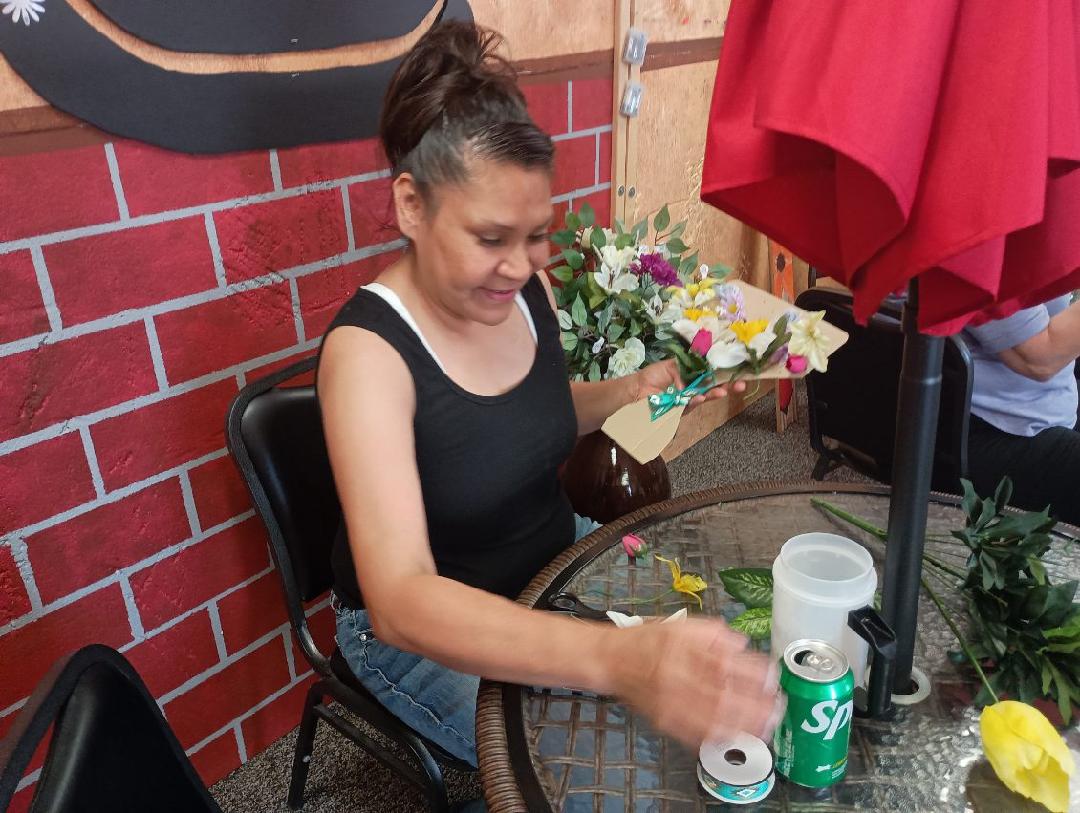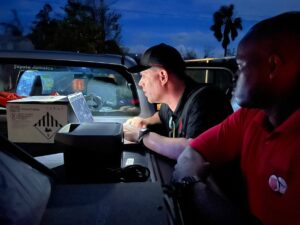In Casper, Wyoming, The Salvation Army WYStepUp program guides women in building stable lives after incarceration.
In Wyoming, 33.8 percent of incarcerated individuals will reoffend and return to prison for the same or a similar offense within five years, according to the World Population Review.
The recidivism rate caught the attention of Major Trish and Captain Timothy Simeroth in 2018, when they were appointed as Casper (Wyoming) Corps Officers.
“We recognized that there were no transitional living programs for women coming out of prison in the entire state of Wyoming,” said Trish Simeroth, now the La Cruces (New Mexico) Corps Officer. “The prosocial dynamics that The Salvation Army can offer through our ministries, services and programs is the best fit to break the chance of recidivism.”
In 2021, the Casper Corps introduced the WyStepUp transitional living program for women, pulling from structures and methods utilized by Salvation Army social services and the Adult Rehabilitation Centers.
WyStepUp program managers communicate with the Wyoming Department of Corrections reentry program to ensure participants keep up with any parole requirements.

After an interview and a one-time fee of $350, participants can join the six-month program from prison. If anyone has challenges paying the fee, sponsors are available to cover it until the participants find a job and can pay it back.
Simeroth said this helps instill habits of being responsible and self-sufficient. “We don’t want participants to get back into a lifestyle of not paying bills,” she said. “We want them to learn how to be in control to break that cycle.”
Once women enter the supportive living environment, they learn to transition to a self-sufficient lifestyle and avoid the circumstances contributing to recidivism.
“We see these large recidivism rates because of a lack of options and resources for women exiting prison,” Simeroth said. “These women can now start a different path with the support and guidance of WyStepUp.”
According to Simeroth, the program assists an average of 20 women each year, with 90 percent of those who complete the program attaining self-sufficiency through stable employment and housing.
“We connect them with the community, welcome them into a supportive family and help them distance themselves from the life that led to their incarceration,” Simeroth said. “They learn to find joy in helping others and themselves.”
Each week, the women visit the Casper Corps to take part in a women’s group (Home League), Bible Study and Sunday services. Additionally, they volunteer at the food pantry until they secure employment.
“It’s important for those in recovery to discover a purpose and realize that they can develop and practice skills that will benefit them instead of harm them,” Simeroth said.
Research from the National Library of Medicine shows that peer support, social interactions and one’s home environment all play a crucial role in individuals’ long-term recovery.
“This program has opened doors that I didn’t know were possible for me before,” said Carrie Creager, WYStepUp participant.
“I really am grateful to be alive today,” she said. “I now see my life as a gift. It’s given me a chance to maintain my sobriety and move forward.”
She joined the program in May 2024 and, within a month, secured a job with a local cleaning business.
“I feel hopeful for my future now,” she said. “The program and the job are helping me stay sober. And being a part of this supportive sisterhood and family has put me in a much better mindset.”
Christi Powers, WyStepUp Program Administrator, said this is the outcome she hopes most participants have.
As their primary contact, Powers supports participants on their path to stability and said she often relates to their challenges having completed the program herself in late 2023.
“I feel like God placed it on my heart to help others that were going through the things that I went through,” Powers said. “Now, I sit down with participants and set up achievable goals and then support them along the way.”
“I’m so appreciative of this program and the support I’ve received.”
Leah Whiteplume
She said her support ranges from joining women at recovery meetings, taking them shopping for essentials, applying to jobs and practicing household tasks such as laundry and cooking.
“Many people who have been in prison or experienced homelessness don’t think about those things anymore,” Powers said. “I reintroduce these things to them and help them develop new, beneficial habits.”
Powers also works to arrange activities to introduce new ways to have fun in sobriety.
“We go to coffee houses, different museums, spend time outdoors and we even have a river rafting trip planned,” Powers said. “It’s all about learning that there are different ways to live and we don’t have to fall back into the life we already know didn’t work.”
According to participant Leah Whiteplume, Powers’ guidance has given her hope.
“I’m in a better place because of WYStepUp and Christi’s support,” Whiteplume said. “I’m becoming who I’m meant to be and it’s all because of this program helping me become stable.”
With the support of the program, Whiteplume has secured a cleaning job with the same company as Creager and recently set up a bank account to begin saving for her future. She said relationships with her family are also improving as a result of her sobriety and new path.
“I’m so appreciative of this program and the support I’ve received,” Whiteplume said. “It’s amazing what happens when you have the right guidance and support.”
Do Good:
- See how The Salvation Army supports rehabilitation.
- Need some extra motivation to do good today? Follow Caring Magazine on Instagram for inspiring stories, podcasts and more to get you in the Fight for Good.












